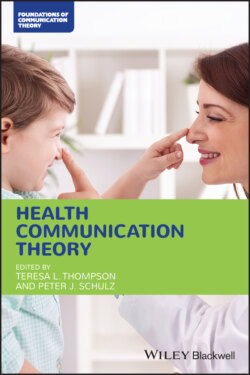Health Communication Theory

Реклама. ООО «ЛитРес», ИНН: 7719571260.
Оглавление
Группа авторов. Health Communication Theory
Table of Contents
List of Tables
List of Illustrations
Guide
Pages
Foundations of Communication Theory
Health Communication Theory
Contributors
1 The Basics of Health Communication Theory
What is Health Communication?
What are Health and Health Care Delivery?
What is Theory? What is Health Communication Theory?
Why Do We Need Health Communication Theory?
Traditions of Health Communication Theory
Generative Tensions in Health Communication
Preview of the Book
Ethics
Conclusion
References
2 Segmenting Priority Audiences Employing Individual Difference Variables to Improve Health Promotion Efforts
Involvement
Health Literacy
Locus of Control
Reactance proneness
Self‐monitoring
Sensation Seeking
Conclusion
References
3 When Theory and Method Intertwine
Philosophical Foundations
Grounded Theory
Theory as Process
Theory as Product
Narrative Theorizing
Illness as a Call for Stories
Narrative Problematics
Narrative Medicine
Autoethnography
Evocative Autoethnography
Analytic Autoethnography
Rhetoric of Health and Medicine
Conclusion
Acknowledgment
References
4 Interpersonal Health Communication Theories
Communication Accommodation Theory and Health
CAT: Concepts and Origins
Applications of CAT
Research Applications of CAT
Appraisal of CAT
CAT: Conclusion
Communication Privacy Management Theory
Origins and Central Concepts
Applications of CPM
Appraisal of CPM
Theory of Negotiated Morality
Some Comparisons and Contrasts
References
Note
5 Families Interacting in the Healthcare Context
Double ABCX Model of Family Stress and Coping
Application to Health Communication
Limits/Merits
Olson’s Circumplex Model of Marital and Family Systems
Application to Health Communication
Limits/Merits
Inconsistent Nurturing as Control
Application to Health Communication
Limits/Merits
Affection Exchange Theory
Application to Health Communication
Limits/Merits
Summary
References
6 Theoretical Frameworks of Provider–Patient Interaction
Proto‐Theory in Studies of Provider–Patient Communication. Status of Theory in Research on Provider–Patient Interaction
Normative Theory
The Ideal of Patient‐Centered Communication
Functions of Patient‐Centered Communication
Pathways Linking Communication to Health Improvement
The Heritage of Antiquity
Narrative Medicine and Rhetoric
Argumentation Theory
Relational Models
Relational Communication Model
Relational Health Communication Competence Model
Dialectical Tensions
Social and Public Conduct
Politeness Theory
Stigma and Stigma Management Communication Theory
Conclusion
References
7 Information‐Processing and Cognitive Theories
Information Processing. The Multiple Motive Heuristic Systematic Model. Origins and central concepts
Applications
Beliefs and Health Behaviors. Attribution Theory. Origin and central concepts
Applications
Health Belief Model. Origin and central concepts
Applications
Health Risk Information Seeking
Risk Perception Attitude Framework. Origins and central concepts
Application
Risk Information Seeking and Processing Model. Origins and central concepts
Applications
Planned Risk Information Seeking Model. Origins and central concepts
Applications
Conclusion
References
Note
8 Theories of Affective Impact
General Psychological Discomfort. Psychological Reactance
Dissonance
Fear‐Based Theories of Influence
Early Fear‐Based Models
Protection Motivation Theory (PMT)
Extended Parallel Process Model (EPPM)
Action Tendency Emotions
Anger
Hope
Other Action Tendency Emotions
General Theories of Emotional Influence
Cognitive‐Functional Model (CFM)
Emotions as Frames Model (EFM)
Emotional Flow
Conclusion
References
9 Theories of Behavior
Social Cognitive Theory
Origin
Basic Claims and Notions
Application in Health Communication,Limits, and Merits
Reasoned Action Theory
Origin
Basic Claims and Notions
Application in Health Communication, Limits, and Merits
Transtheoretical Model of Behavior Change
Origin
Basic Claims and Notions
Application in Health Communication,Limits, and Merits
Conclusions
References
10 Theories of Message Effects
Agenda Setting
Cultivation Theory
Narrative Engagement Framework
Framing Theory
Inoculation Theory
Uses and Gratifications Theory
Media Complementarity Theory
Conclusion
References
11 Social Psychological Influences on Health Communication: An Examination of Four Theories
Diffusion of Innovation
Four Main Elements in the Diffusion of Innovations
The Innovation‐Decision Process
Attributes of Innovations that Influence Diffusion
Adapter Categories
Social Judgment Theory
Ordered Alternatives Questionnaire
Anchor, Latitude of Acceptance, Latitude of Rejection, and Latitude of Noncommitment
The Effects of Ego‐Involvement and the Latitudes
Self‐Determination Theory
Basic Psychological Needs
Extrinsic and Intrinsic Motivations
Autonomous Motivation and Controlled Motivation
Autonomy Support
Social Comparison Theory
Festinger’s Theory of Social Comparison Processes
Motives for Social Comparison
Types of Social Comparison
Consequences of Social Comparison
Conclusion
References
12 Theories of Public Relations
The Situational Theory of Publics
Theoretical Origins of the Situational Theory of Publics
Central Constructs of the Situational Theory of Publics
Identifying Publics using the Situational Theory of Publics
Application
Appraisal
The Situational Theory of Problem‐Solving
Theoretical Origins of the Situational Theory of Problem‐Solving
Central Constructs of the Situational Theory of Problem‐Solving
Communicative Action in Problem‐Solving
Antecedents of CAPS
Application
Conclusion
References
13 Theories of Uncertainty
Harm Reduction. Origins and Central Concepts
Applications
Appraisal
Uncertainty Management Theory. Origins and Central Concepts
Applications
Appraisal
The Theory of Motivated Information Management. Origins and Central Concepts
Applications
Appraisal
Problematic Integration Theory. Origins and Central Concepts
Applications
Appraisal
Conclusion
References
Note
14 Cultural Theories of Health Communication
Interdisciplinary Foundations
From the Biomedical to the Biopsychosocial Model
The Biocultural Model
Social Determinants of Health and Health Disparities
Cultural Competency, Cultural Humility,and Structural Humility
Culture as Variable: Correlational Studies of Culture in Health Communication
Targeting and Tailoring
Social Determinants of Health, Health Literacy,and Health Communication
Concordance, Implicit Bias
Globalization and Development Communication
Culture as Context: Ecological, Language, and Performance Perspectives in Health Communication
Ecological Theories
Language, and Social Interaction
Ethnography and Analysis of Performance
Culture as Critique: Political, Structural, and Ideological Considerations in Health Communication
Conclusion
References
15 Effects of Digital Media Technology on Health Communication
Cue route
MAIN Model
Network Influence and Social Contagion
Proteus Effect
Action Route
Agency Model
Selective Exposure Self‐ and Affect‐Management Model
Motivational Technology Model
Gamification
Interactivity Effects Model
Captology
Conclusion
References
16 Directions in Health Communication Theory
The Need for Multilevel, Systems‐Oriented Thinking about Health
The Need for Longitudinal Theorizing
The Need to Consider Translation,Implementation, and Dissemination
The Need for Integration with Regulatory Science
The Need to Theorize about Misinformation
Summary
References
Index
WILEY END USER LICENSE AGREEMENT
Отрывок из книги
Series Editor Marshall Scott Poole (University of Illinois, Champaign‐Urbana)
Editorial Board James Aune (Texas A&M University); Robert T. Craig (University of Colorado at Boulder); Leah Lievrouw (University of California Los Angeles); Alan Rubin (Kent State University, Emeritus); David Seibold (University of California Santa Barbara)
.....
Barbara F. Sharf, Independent Scholar and Professor Emerita, Dept. of Communication, Texas A & M University
Brian G. Southwell, RTI International, Duke University, University of North Carolina at Chapel Hill
.....